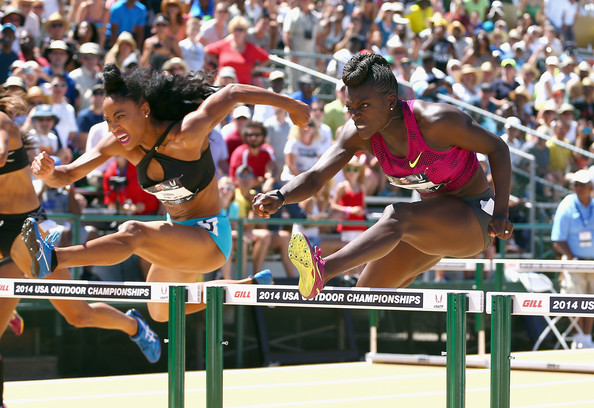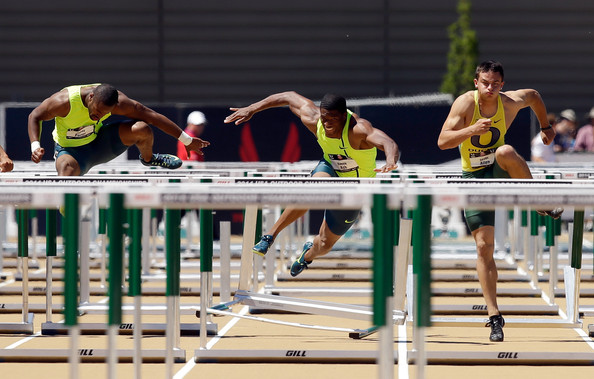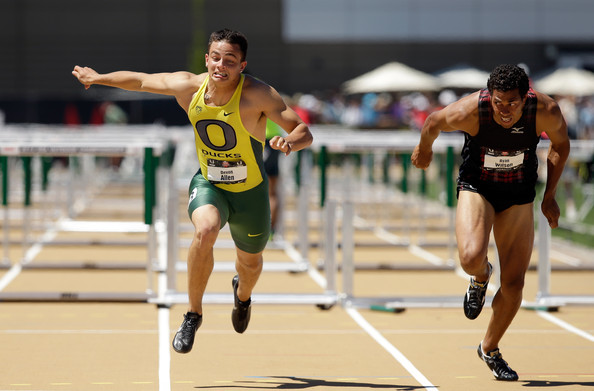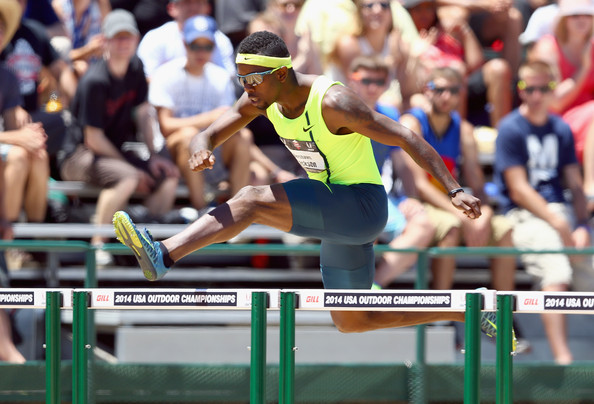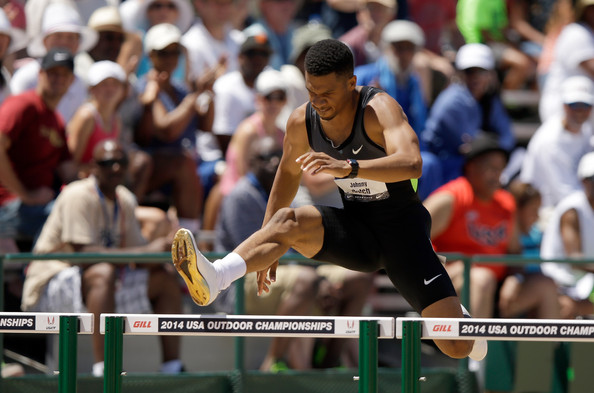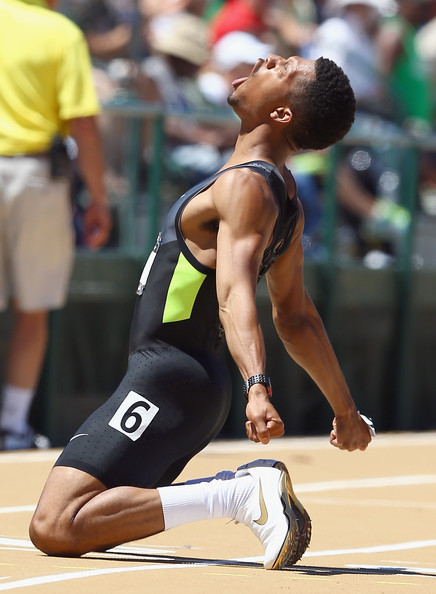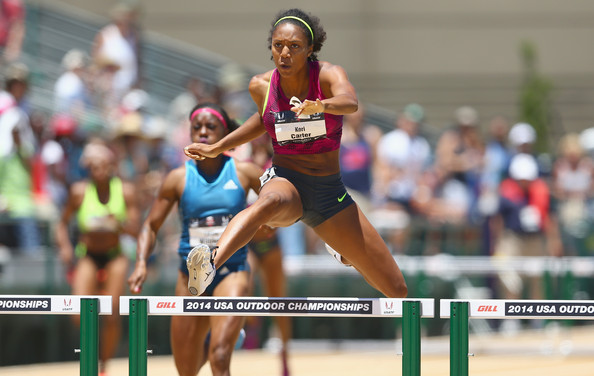A Look Back at USA Championships
The USA Championships at the end of June proved to be very exciting and full of intrigue. Despite the fact that the overall level of performance was indicative of the fact that there was no international team to make – as there are no World Championships or Olympic Games in 2014 – there were some outstanding individual performances that made us eager to see who will be battling to make next year’s World Championship team.
So let’s take a look back at the four hurdling events and see what we can glean.
Women’s 100m Hurdles:
Finals Results (-1.6 wind):
1st Dawn Harper-Nelson 12.55
2nd Queen Harrison 12.56
3rd Lolo Jones 12.65
You gotta love Dawn Harper-Nelson. While often overshadowed by more glamorous names in the event, Harper-Nelson has been the most consistently outstanding 100m hurdler in the world over the past seven years, dating back to her Olympic victory in 2008. Sally Pearson’s wizardry in 2012, Brianna Rollins’ sudden emergence as a dominant force in 2013, and the constant hype and controversy surrounding Lolo Jones have led Harper-Nelson to remain in the relative shadows. But I would argue that you could make a case for her being the greatest ever in the event. She has made significant improvements to her technique over the past couple years, she masterfully negotiates the space between the hurdles, and she never makes mistakes late in a race.
[am4show not_have=”g5;”]
[/am4show][am4guest]
[/am4guest][am4show have=”g5;”]
Here at USA’s Harper looked like the best hurdler throughout the rounds. Clean, efficient, confident. Queen Harrison also breezed effortlessly through the rounds, easily winning her less competitive semi-final heat. Lolo Jones also looked sharp in the rounds. Meanwhile, although Rollins wasn’t looking like a slouch, it seemed quite evident that she wasn’t the same Rollins of 2013, when she just steamrolled her way to victory after victory.
A brief aside here to complain about the format for qualifying for the finals. The top four finishers in each semi-final heat automatically qualify, as opposed to the top two and next four fastest, or the top three and next two fastest. When taking the top four of each heat, there’s the potential that runners in a fast heat will be left out of the finals even though they ran faster than athletes in a slower heat. That’s what happened here. In the first semi, Harper-Nelson and Jones smoked to 12.54 and 12.55, respectively, into a -1.6 headwind. In the second heat, Harrison won in 12.70, with a +1.3 tailwind. Two athletes in the first heat – Tiffani McReynolds and Jackie Coward – were among the top eight finishers based strictly on time, but they finished fifth and sixth, respectively, in their heat. Meanwhile, Kendra Harrison and Nia Ali ran slower than McReynolds and Coward, but finished third and fourth, respectively, in their heat. As a result, Although McReynolds and Coward ran 12.81 and 12.82 into a headwind, while Harrison and Ali ran 12.93 and 13.00 with a tailwind, the former two did not qualify for the final but the latter two did. Now, everybody who knows me knows that Kendra Harrison is my girl because I used to coach her, but I’d rather she not make the final that way – when there are other hurdlers who ran faster. It’s an age-old argument, I know, but the inherent flaws in allowing the top four to make it regardless of time was really exposed in this women’s 100m hurdle semi-final round.
The final was a thrilling race. Don’t be fooled by the slow times, as the headwind was strong again (which is perhaps a bit ironic considering how blazing hot it was). Early on it became clear that Harper-Nelson and Queen Harrison were going to battle it out for the win. Lolo was also hanging in there, but didn’t look as quick over the hurdles as she had in the semis. Coming off the last hurdle it looked like it was going to be Harrison, but Harper-Nelson, a master of running off the last hurdle and timing her lean across the finish line, got the nod by .01. Both women ran excellent, well-executed races.
The way this event unfolded through the rounds proves the fact that you can’t go by last year. A lot of people thought after Rollins’ 2013 campaign that she was unbeatable, but track and field is an unforgiving sport, and you don’t have to fall off a lot to fall off enough. Harrison is probably the biggest story of the meet in this event. A glamour girl in the mold of Flo-Jo, Harrison is a fierce competitor who will most likely be among the world’s top hurdlers for a long time. But for the hurdling purists, the big story is that of Harper-Nelson, who continues to add to an already brilliant career every time she steps on the track.
Men’s 110 Hurdles:
Finals Results (+2.1 wind):
1st Devon Allen 13.16
2nd Ryan Wilson 13.16
3rd David Oliver 13.23
What a crazy, unpredictable this event turned out to be! Every year in the 110’s, new faces emerge while old faces either disappear or fall to the background. In 2012 Aries Merritt and Jason Richardson took over as top dogs, then in 2013 old-heads David Oliver and Ryan Wilson had don’t-call-it-a-comeback years, and here in 2014 this young buck football player Devon Allen from the University of Oregon shocks everybody. His NCAA victory a week earlier was shocking enough, as most prognosticators (including me) assumed that it would come down to defending champion Wayne Davis II of Texas A&M or Aleec Harris of USC, who had the fastest collegiate time in the nation heading into nationals. But Allen surpassed them both.
Defeating fellow collegians was one thing, but there was no reason to expect he’d be able to carry that success over to USA Nationals, where he’d be competing against established pros with lots of medal hardware to their name.
At first, it was looking like neither Allen nor any of the established stars were on pace to claim a victory, but that Ronnie Ash, back from the dead after falling off the face of the earth in 2013, was going to demolish everybody.
In the first semi-final heat, Ash blasted the field with a 12.99 that looked easy. He looked powerful, fluid, and totally in control. Harris finished second in a distant 13.20. Oliver, who had an awfully slow reaction to the gun, finished third in 13.30. The second heat was won by another old-schooler, Jeff Porter, in 13.12. Allen was second in 13.23, with Wilson third in 13.31.
Heading into the finals, it looked like Ash was ready to start a new era in the 110 hurdles – the Ronnie Ash era. And when the race started and he took a commanding lead, there was no reason to think otherwise. If he ran 12.99 in the semis, it was looking like he was on pace to run 12.89 in the final. Who knows, maybe faster. But something happened; I’m not sure what. He got too close to hurdle seven and basically ran through it, and that was that.
Though I don’t know what happened, let me speculate a bit. It appears that he was shifting into a higher gear. But as we all know, in the high hurdles, to shift gears effectively, you have to quicken up your strides, not open up your strides. He appears to have opened up, taking away the space he needed to negotiate the barrier. It’s a very common mistake, although it usually occurs when the athlete is chasing someone from behind. In Ash’s case, he was in the lead, and pulling further away.
Regardless, Ash’s semi final race remains the fastest race of the meet, and the most impressive. And I love Ash’s lead arm action. It is very tight and efficient and creates a lot of speed off the hurdle.
Meanwhile, after Ash’s fall, Allen emerged as the race leader, but then Wilson made a big move around hurdle nine. They crossed the finish line in a virtual dead heat, and Allen was given the victory based on the photo finish. What stands out most about Allen is not his technique or power or anything like that, but his demeanor and mindset. He doesn’t care who he’s running against, what their credentials are, what they’ve done in the past. He lines up expecting to win, knowing he can. Whether the young college freshman will stick with the hurdles or pursue his football ambitions remains to be seen, but you know what I’m hoping for.
On a side note, you could tell it was a down year by the relatively slow winning time. None of the big dogs have been their old selves this year – Oliver’s been solid but has been stuck in the 13.2’s, Richardson is struggling, Merritt is nowhere to be found, Wilson is looking good but not 2013 good. As of this writing, it’s looking like more and more 110 hurdlers from other countries are making their mark while the Americans fight to get their old form back. You got Pascal Martinot-Lagarde of France, Hansle Parchment of Jamaica, Orlando Ortega of Cuba, to name a few, all running big times in Diamond League meets. The Americans will have to raise their game if they are to continue their winning ways of 2012 and 2013 into 2015 and 2016.
Men’s 400 Hurdles:
Finals Results:
1st Johnny Dutch 48.93
2nd Michael Stigler 49.63
3rd Reggie Wyatt 50.16
The old Kanye West song, “When it All Falls Down” comes to mind when thinking of how this events unfolded. Michael Tinsley, probably the favorite heading into the meet, didn’t make it out of the first round. He hit a hurdle mid-way through the race that caused a major stumble but not a fall. It looked like he could’ve gotten back into the race well enough to make it to the next round, but his rhythm was off and he seemed to just say the hell with it by hurdle nine. He’s been doing very well in Diamond League meets since then, so maybe he decided to cut his losses. Again, these kinds of things only happen in down years. If there had been a team to make, you best believe he’d’ve battled back and gotten himself into the semis.
Probably the saddest story of the meet is that of Bershawn Jackson, who has suffered his share of heartbreak over the years, including a hamstring pull that knocked him out of the semi-final race in Moscow at last year’s World Championships. Here, he was showing no signs of strain as he cruised to an easy 50.09 first-place finish in the first preliminary heat. In the semis, he won his heat again, this time in 49.48 – the fastest time heading into the finals. Again, it looked easy and fluid.
But in the final, Jackson started pulling up before he even reached the first hurdle. He cleared it clumsily before falling to the ground in pain. This time it was his groin that betrayed him.
So, heading into the last nine hurdles of the finals, two of the three favorites were out of the race. The third favorite, Johnny Dutch, was rolling. Dutch had also looked very good in the rounds, jogging across the line in the prelims in 49.99, then having a similarly easy time in the semis, coming across in 49.58.
In the final, Dutch ran with remarkable precision and ease of motion, stepping over each hurdle with minimal effort and executing his stride pattern strategy without a hiccup. Slightly ahead coming off hurdle eight and into the final straight-away, he pulled away from the rest of the field and won by a very comfortable margin. His 48.93 was slow for a national championship final, but it’s pretty evident that the time would’ve been in the 48-low range had Tinsley and Jackson been there to push him. It was Dutch’s first national championship after seven years of trying, so the victory was sweet.
Women’s 400 Hurdles:
Finals Results:
1st Kori Carter 53.84
2nd Georganne Moline 54.00
3rd Cassandra Tate 54.70
It’s a bit of redemption for Kori Carter, who is emerging at a top-notch performer in this event, and perhaps the next American star (time will tell). Last year Carter suffered a stomach ailment that prevented her from competing at USA’s after a big NCAA victory. Carter won her first round preliminary heat easily in 56.56, but Tiffany Williams looked very strong in winning heat two in 55.14. Georganne Moline suffered a Tinsley-like stumble in the third heat, but, unlike Tinsley, fought back and made it to the next round. Cassandra Tate won that heat in 56.28.
In the semis, Williams continued to impress, running 54.74 – the only semi-finalist to run under 55.00. Moline, Tate, and Carter also looked good and made it comfortably into the final. Living legend Lashinda Demus also made it to the final, but wasn’t looking like her old self. It was a stretch to think she would make any noise in the final.
In the final, Carter turned it up a couple notches. The thing about the 400 hurdles is, you have to conserve energy in the early rounds, but you have to stay sharp. It’s a very difficult balance to achieve. The women had to run the first round on Friday, the second round on Saturday, and the third round on Sunday. All in extreme heat. In the most demanding event in the sport (yeah, I said it). In Carter’s case, her relatively slow times in the rounds helped to contribute to her impressive performance in the final. In the latter stages of the race it looked like Moline might be able to mount a charge, but Carter was just too strong and just too efficient. When someone’s rolling like she was rolling, you have to hope she makes a mistake. But she didn’t make any mistakes. Demus was in the thick of things coming off hurdle eight, but faded over the last two hurdles and finished fifth. Williams similarly looked strong but couldn’t quite hold on. Tate looked good in finishing third.
***
Footage of all races, including prelims, can be found at www.usatf.tv.
[/am4show]
